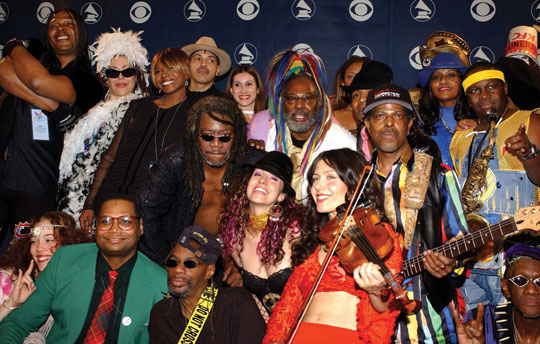 MCT
MCTThe unforgetable chant “Bow-Wow-Wow Yippie-Yo-Yippie-Yay” have graced the mainstream music scene for the last 15 years. Whenever one thinks of the laid-back rap style (and other habits) of Snoop Doggy Dog, these words are often the first that come to mind. But Snoop Dogg’s signature song is not exactly unique. It is one of more than 25 songs that samples from George Clinton’s “Atomic Dog,” a 1982 funk masterpiece that has been used by, among others, Dr. Dre, Ice-T, Ice Cube, Public Enemy, Redman and 2Pac.
The deep funk, better known as P-Funk, pioneered by George Clinton and his various bands, has made him the second most-sampled artist in hip-hop after James Brown. His songs stand on their own as some of the best funk ever produced; his live concerts are freewheeling and extravagant. And this weekend George Clinton and the Parliament-Funkadelic are coming to W.I.L.D. to showcase their greasy and grooving funk.
The saga that is George Clinton began on July 22, 1942 in Kannapolis, N.C. But his musical interests began forming when he was living in New Jersey as a youngster. Clinton originally formed “The Parliaments” as a doo-wop group. They even had a small hit in 1967 with “I Want to Testify.” Then, because of arguments with the record label, George Clinton formed “Funkadelic” which became the main outlet for his musical experimentation. The band released seminal rock albums like “Maggot Brain” and “Free Your Mind.And Your Ass Will Follow.”
Keyboardist Bernie Worrell began playing with Funkadelic in the early 1970s. He soon became one of the most essential components of Funkadelic. Working with George Clinton, they developed the trademark synthesizers and well-orchestrated horn parts of P-Funk sound. Two years after the addition of Bernie Worrell, Bootsy Collins joined Funkadelic. Collins was famous for playing bass with James Brown, and his contributions were essential to Clinton’s ensembles during the ’70s.
Between 1970 and 1974 Funkadelic released five albums including “Cosmic Slop” and “America Eats Its Young.” In 1974 Clinton decided to reform Parliament, which would develop a more mainstream sound. Between 1974 and 1980 Parliament released a slew of albums, definitive examples of the slow, hard-grooving funk for which Clinton is still famous. Albums such as “Mothership Connection,” “Clone of Dr. Funkenstein” and “Moter Booty Affair” have been so consistently sampled by rap-artists that many tunes have become ubiquitous without ever charting as singles. Parliament excelled at producing albums that worked as a single unit and some of their best songs were more than six or seven minutes long, which made them untenable as singles.
Fortunately, Clinton was not content with having Parliament as his only musical outlet. Even though Parliament was producing the more mainstream music that helped him achieve widespread fame, Clinton had not abandoned Funkadelic. The band continued to release albums throughout the 1970s, focusing on less-mainstream funk-rock. They hit their musical peak in the late 1970s, releasing one of the most cohesive and powerful albums of Clinton’s career: “One Nation Under A Groove.” Its powerful funk lines and refusal to conform to the standard notions of funk hit a chord with the American public. It was Clinton’s first album to go platinum and is considered to be a masterpiece of Funk.
Unfortunately, the momentum that was sustained by both Parliament and Funkadelic began to unravel in the early 1980s. Clinton dissolved the Parliament collective in 1980 and Funkadelic recorded its last album in 1984. This did not stop Clinton’s momentum, at least initially. One of his first solo albums, 1982’s “Computer Games” was a huge success. In particular, the song “Atomic Dog,” which featured drum machines and synth lines, helped propel the album into a permanent place in the funk lexicon.
By the mid 1980s Clinton had reunited with many of his former band-mates and began to tour and record as “George Clinton and the P-Funk All-Stars” (which would eventually evolve into “George Clinton and Parliament-Funkadelic,” which is the incarnation of the band that is playing at W.I.L.D.).
After “Computer Games,” Clinton’s popularity waned for most of the 1980s. Few of his records made the R&B charts, and he produced little material that was considered noteworthy. It was not until the early 1990s that Clinton began to regain his stature as one of the pioneers of funk. This led to the resurgence in his popularity that still exists today.
Clinton’s second rise in popularity grew from the fact that P-Funk became the basis for a new rap style called G-Funk. Developed by Dr. Dre during the 1990s, G-Funk uses the slow, hard beats from P-Funk. Dr. Dre’s first solo album “The Chronic” is, in essence, a collection of slower, rap-fueled Parliament and Funkadelic samples. The album was a massive success and reintroduced the public to the grooves of George Clinton. Many of Dr. Dre’s disciples, who used his Parliament-based G-Funk, include Snoop Dogg, Warren G, Nate Dogg and Tha Dogg Pound. These artists helped the music of George Clinton reach millions of Americans throughout the 1990s. Hip-hop’s greatest artists pay homage to Clinton by sampling his songs and have earned his music, if not success, then at least recognition with a new generation of listeners.
The saga of George Clinton will continue Friday night on Brookings Quad, where his band is the headliner of W.I.L.D. They play wild and uncontainable live shows that leave audience members mesmerized.